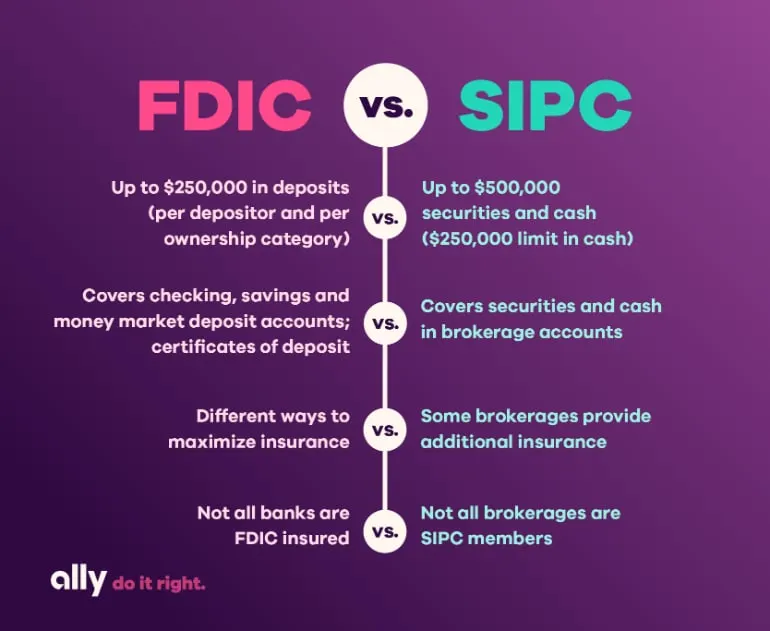What we'll cover
How the FDIC provides insurance for your deposits
Ways that SIPC protects against losses
How to check for FDIC and SIPC insurance
Certain financial terms look like an alphabet soup of letters (and sometimes numbers). However, it's worth knowing the definitions of and understanding SIPC vs. FDIC insurance.
SIPC stands for "Securities Investor Protection Corporation," and FDIC stands for "Federal Deposit Insurance Corporation."
FDIC and SIPC are both a type of insurance that offers protection for your money, but that’s where the similarities end.
We’ll look at both the SIPC vs. FDIC to explain the differences and help you understand whether your account is insured. Take a look at the chart below for a quick overview.
| SIPC member brokerages | FDIC-insured banks |
|---|---|---|
What it covers | Brokerage-held securities and cash | Funds in deposit accounts |
Coverage limit | $500,000 for securities and cash (up to $250,000 in cash) per account based on separate capacity | $250,000 per depositor, per insured bank, for each ownership category |
When it applies | When an SIPC member brokerage firm fails | When an FDIC-insured bank fails |
How it works | A claim for a specific account could be paid up to the coverage limit. | You receive money if your deposit bank closes, covering up to the coverage limit |
What is SIPC insurance?
The SIPC, which was created as part of the Securities Investor Protection Act of 1970, is a nonprofit corporation that protects investors against losses if their brokerage firm fails. In short, you're protected if you have money in an account with an SIPC member firm and it goes under. However, not every brokerage is an SIPC member. If you’re looking to better protect your investments, it's important that you choose a brokerage that is an SIPC member — just in case the worst were to happen.
What does SIPC cover?
SIPC protects investors against the loss of cash and securities like stocks and bonds, Treasury securities, investment certificates of deposit (CDs), mutual funds, money market mutual funds and other securities held at SIPC member brokerages. However, it's important to note that SIPC does not protect the following:
Foreign exchange trades
Investment contracts (such as limited partnerships)
Fixed annuity contracts not registered with the U.S. Securities and Exchange Commission under the Securities Act of 1933
Commodity futures contracts, unless held in a special portfolio margining account
What happens if you receive poor investment advice? Does the SIPC protect you? The answer is no. If your securities drop in value, the SIPC does not protect you. Its sole focus is restoring investor cash and securities as swiftly as possible after an SIPC member brokerage fails.
While the SIPC was created through an act of Congress, it’s not a government agency or organization. Because of this, it has no authority to investigate fraud or regulate shady broker dealings and poor investment advice. (The Financial Industry Regulatory Authority, or FINRA, a not-for-profit organization, regulates this kind of behavior.) Plus, the SIPC doesn’t cover stock market losses or other costs associated with normal investing risk.
SIPC coverage amount
SIPC insures multiple accounts at a single brokerage based on separate capacity. Each separate capacity is protected up to $500,000 for securities and cash (up to $250,000 of which can be cash). Examples of separate capacities include individual, joint, IRA or Roth accounts.
How many investors have received help with SIPC coverage? From its inception in 1970 through December 2020, the SIPC put forth $3.1 billion to recover $141.8 billion in assets for an estimated 773,000 investors.
FDIC vs SIPC: Neither is "better" than the other, and in fact, you need both depending on the types of accounts you have.
What is FDIC insurance?
The FDIC, which was created in 1933, is an independent agency of the United States government that provides insurance for your insured bank deposits in the event that your FDIC-insured bank or savings association fails. FDIC insurance is backed by the full faith and credit of the United States government.
In other words, if your funds are in an FDIC-insured bank account (such as at Ally Bank), your money is insured — up to $250,000 per depositer for each qualifying ownership category.
If your bank isn’t a member of the FDIC, it could be bad news. It means that if the institution files for bankruptcy, closes or suffers another type of financial hardship, your money isn’t FDIC-insured. While many banks are FDIC insured, not all are. Know whether your financial institution is FDIC insured before you choose where to deposit your money.
What does FDIC cover?
Deposit products insured by the FDIC include the following:
Checking accounts
Savings accounts
Certificates of deposit (CDs)
Money market deposit accounts
Investment products that are not deposits, such as mutual funds, annuities, life insurance policies and stocks and bonds, are not covered by FDIC deposit insurance.
FDIC coverage amount
The amount of FDIC insurance coverage you may be able to get depends on how you hold your funds, which can include in single accounts, joint accounts, certain retirement accounts, employee benefit plan accounts, trust accounts, business accounts as well as government accounts.
The standard insurance amount is $250,000 in deposits, which includes principal and accrued interest.

How to know if your account is insured
Now that you know the difference between FDIC and SIPC, it's important to find out whether your banks and brokerages are members of their respective organizations. Not having either can spell bad news in case of financial institution failure.
Ally Bank is FDIC insured. If your current financial institution isn’t insured, browse our bank accounts to see if our offerings align with your financial goals.
Investors, take note: Ally Invest is a member of the SIPC, so you can take that into consideration when selecting a brokerage.
SIPC vs. FDIC: Why you need them
FDIC vs. SIPC: Neither is "better" than the other, and in fact, you may need both depending on the types of accounts you have.
Most banks and brokerages are covered, but it doesn’t hurt to double check. Both the FDIC and SIPC offer searchable databases of their members, so double check that you’re currently banking and investing with insured institutions.



